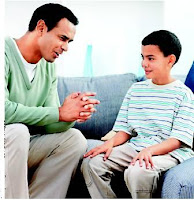"In any type of social setting, my daughter (high functioning) is very withdrawn and will rarely speak to anyone unless they speak to her. How can I teach her to be just a bit more social in a way that fits her comfort level?"
 Because Aspergers and high-functioning autistic (HFA) youngsters often have difficulty perceiving the “ins and outs” of typical social interactions, your daughter may feel uncomfortable or be pegged as socially “awkward” when it comes to conversation with friends, family, teachers, etc.
Because Aspergers and high-functioning autistic (HFA) youngsters often have difficulty perceiving the “ins and outs” of typical social interactions, your daughter may feel uncomfortable or be pegged as socially “awkward” when it comes to conversation with friends, family, teachers, etc.
Navigating the “ebb and flow” of everyday interactions can be an art for anyone – but it can be especially precarious for a child on the autism spectrum. However, with parental support, these young people can grow to learn ways to improvise and improve the quality of those interactions.
 Because Aspergers and high-functioning autistic (HFA) youngsters often have difficulty perceiving the “ins and outs” of typical social interactions, your daughter may feel uncomfortable or be pegged as socially “awkward” when it comes to conversation with friends, family, teachers, etc.
Because Aspergers and high-functioning autistic (HFA) youngsters often have difficulty perceiving the “ins and outs” of typical social interactions, your daughter may feel uncomfortable or be pegged as socially “awkward” when it comes to conversation with friends, family, teachers, etc.Navigating the “ebb and flow” of everyday interactions can be an art for anyone – but it can be especially precarious for a child on the autism spectrum. However, with parental support, these young people can grow to learn ways to improvise and improve the quality of those interactions.
Some Aspergers and HFA kids appear shy and withdrawn, rarely speaking unless spoken to. Others may dominate the conversation with lengthy discussions about their special interests. Your youngster may reflect these traits at different times, or generally fall somewhere in between. The social skills you teach your youngster now will have long-term benefit as he matures through the teenage years and into adulthood. Learning how to develop social circles and relationships that can lead to true friendship is important to your youngster's future successes and mental health stability.
The youngster who appears shy and withdrawn often wants to “fit-in” and get along with others, but doesn't know where to begin. Similarly, the youngster who is overly verbal knows how to talk circles around a particular topic and may think that everyone has the same degree of interest such that they are spellbound. This youngster also doesn't realize the “give and take” of social interactions and needs some help with interpersonal relationship skills.
How Parents Can Teach Interpersonal Relationship Skills—
1. Use cartoons to teach relationship skills. Your youngster may respond well to understanding social conversation when his favorite TV cartoon show is involved. It is best to record the cartoon on DVD so that you can start and stop the show and highlight “good versus inappropriate” conversation styles. Help your youngster to reinforce what he's just seen by drawing it out on paper. Suggest that you both modify the conversation a bit.
2. Teach “conversation-starters” and “conversation-enders.” Many kids on the spectrum have terrific rote memories if they are able to create images of situations to best “match” the conversation “starter” or “ender.” To begin, partner with your youngster to break down, in writing and pictures, lists for each area. Here are a few sample conversation starters and enders:
- “Good morning Mr. Smith.”
- “Hello” or “Hi”
- “Hey!”
- “How's it going?”
- “What are you doing after school?”
- “What did you do over the weekend?”
- “What did you watch on TV last night?”
- “What's up?”
- “I gotta go now.”
- “I'll catch you later.”
- “I'll see you tomorrow.”
- “I'll talk to you after school.”
- “See ya Friday.”
- “Take it easy.”
Sit down with your youngster and come up with additions to the list above. What do your child’s favorite cartoon or TV characters use as conversation starters or enders that are socially acceptable and fit well on the list? Talk about how no one “owns” these conversation starters or enders – anyone can use them!
3. Teach your child to provide “feedback” to the other person during conversations. Feedback is a response to conversation starters or enders initiated by someone else. Providing feedback may include responding with a question in order to elicit more information from the other person. Tell your child that providing feedback is like building a sky scraper. Each piece of the conversation adds layers to the foundation either person began. When the conversation changes topic, the process of building the sky scraper starts over. Providing feedback is always a useful tool to “fall back on” whenever your child is uncertain of what to say. For example:
- “Awesome!”
- “Cool!”
- “I don't know what that is – tell me more!”
- “I never heard of that before. Can you explain it to me?”
- “I'm sorry about that.”
- “That's interesting!”
- “That's really neat!”
4. Teach your child how to “interject” in an appropriate manner. Interjections are socially acceptable alternatives to interrupting conversation. Your youngster will need to appreciate, through words and images, that it is considered rude to interrupt in conversation, but there are ways to “interject” without being rude. You and your child can identify when this works best (usually during a conversation lull or when someone has stopped talking). Interjections may include:
- “Can I say something now?”
- “Excuse me, please.”
- “May I add to what you're saying?”
- “Pardon me for interrupting, but…”
- “Can I tell you about something similar that happened to me?”
Some of these statements might be too formal for a young person and would be better suited for an older teenager. Perhaps you and your son or daughter can come up with other statements to add to this list (ones that are more your child’s style).
Mistakes and unexpected circumstances are bound to occur, and these will require private and respectful debriefing to explain. With time, you and your youngster can modify and adapt his “bag of conversational tricks” to become adept in carrying on a good conversation.
5. Find opportunities that are available in your community by which you can support your youngster in making contacts to build on his special interests (e.g., passion for insects, astronomy, Japanese animation, etc.). If you are uncertain, start by pursuing the following:
- After-school activities sponsored by your school district
- Community classes such as arts and crafts, or martial arts
- Community projects or special celebration days
- Opportunities offered through local television and radio stations
- Opportunities offered through the newspaper or local circulars
- Programs and special events offered by your local historical society or museums
- Programs and special events offered by your local library
- Special events sponsored by local athletic leagues
One of the most powerful ways to connect with others with similar passions is through the Internet. The possibilities are endless. Your youngster may learn more about other children of the same age, beyond just the passion they share, by locating them on a map and learning about the local industry, economy, and more. The youngster passionate about Japanese animation may even have the chance to communicate with someone of that culture. They can compare notes and exchange ideas about the video games each is developing.
6. Consider forming a group for children with Aspergers in your community. These groups provide a forum for unconditional acceptance in a safe and comfortable environment. Such groups do not advocate exclusion from neurotypical kids; rather, they are an opportunity for some kids to learn social skills in a place where it's perfectly acceptable to mess-up as you learn and practice.
Your local school district or county human service program may be able to tell you if any such group already exists in your town - or a neighboring town. Most likely, moms and dads previously unconnected will want to meet to discuss the similarities of their lives, but the focus should stay on supporting the kids to meet their individual needs in a comfortable atmosphere.
Your local school district or county human service program may be able to tell you if any such group already exists in your town - or a neighboring town. Most likely, moms and dads previously unconnected will want to meet to discuss the similarities of their lives, but the focus should stay on supporting the kids to meet their individual needs in a comfortable atmosphere.
7. Don’t force your child to be more “social” and “conversational” than he is comfortably able. “Social” should be defined differently for each person, depending on that individual’s needs. You, as a neurotypical parent, may value many friends as a mark of being socially successful. Some Aspies, however, are content with just a few, select friends.
Most kids on the spectrum are not social butterflies …don't wish to be …and never will be. Unless they want to become more out-going, such individuals may simply be completely comfortable with a small group of close-knit friends. As a mother or father, you can arrange to expose your youngster to a variety of people within a range of environments and circumstances. Your youngster will guide you to those with whom he feels connected and wishes to know better.
Most kids on the spectrum are not social butterflies …don't wish to be …and never will be. Unless they want to become more out-going, such individuals may simply be completely comfortable with a small group of close-knit friends. As a mother or father, you can arrange to expose your youngster to a variety of people within a range of environments and circumstances. Your youngster will guide you to those with whom he feels connected and wishes to know better.
More resources for parents of children and teens with High-Functioning Autism and Asperger's:
==> How To Prevent Meltdowns and Tantrums In Children With High-Functioning Autism and Asperger's
==> Parenting System that Significantly Reduces Defiant Behavior in Teens with Aspergers and High-Functioning Autism
==> Launching Adult Children with Asperger's and High-Functioning Autism: Guide for Parents Who Want to Promote Self-Reliance
==> Teaching Social Skills and Emotion Management to Children and Teens with Asperger's and High-Functioning Autism
==> Parenting Children and Teens with High-Functioning Autism: Comprehensive Handbook
==> Unraveling The Mystery Behind Asperger's and High-Functioning Autism: Audio Book





